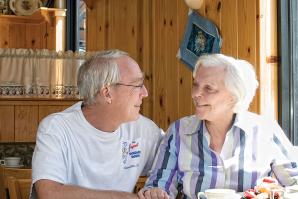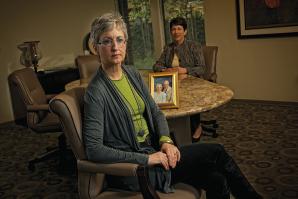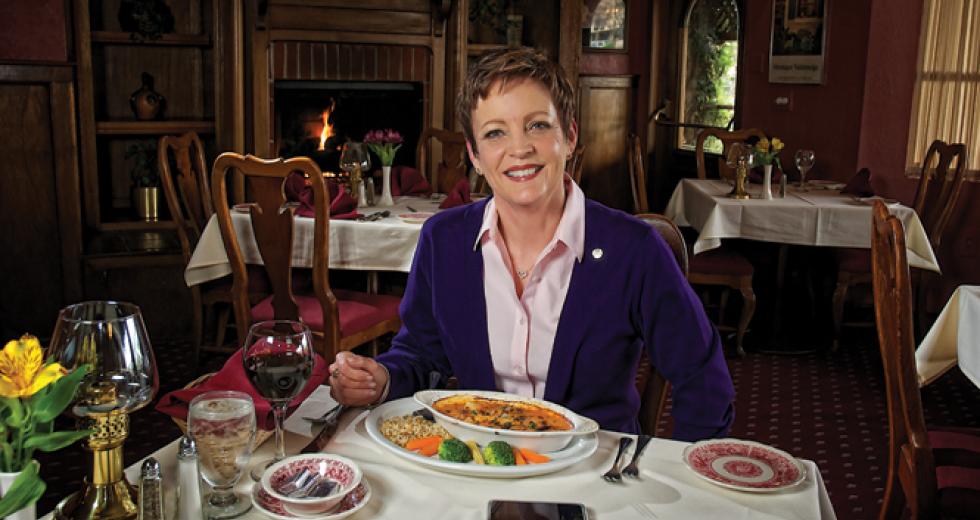In 2002 Michael Walter was diagnosed with Alzheimer’s, but to his wife, Beth, the diagnosis just didn’t seem to fit the symptoms. So she Googled “ALS brain-related disease” — frontotemporal degeneration popped up.
“The symptoms seemed to match, and there was a link requesting research participants at a national institute in Bethesda, Maryland,” Beth Walter says. “I’ve always been a person that operates better with knowledge, whether it’s good news or bad. So I signed him up.”
Through this research it was determined that Michael, as well as his brothers, Steve and Phillip, all had the deadly disease.
“Diagnosis is difficult because many times it does not manifest itself in ways that are immediately recognizable. It might look like the person has unusual personality traits, makes strange decisions or acts socially inappropriate,” she says. “In my husband’s case, most people would not have known he was ill until 60 days before he died.”
While early-stage FTD research is ongoing, there is no treatment. There are no drugs that will slow, mutate or alter the symptoms. It typically manifests in a person’s mid-50s.
“We do not know how it comes upon any particular individual. We do know it can be genetic, familial or sporadic,” Walter says.
To help address some of these unknowns Walter got involved in The Association for Frontotemporal Degeneration. Headquarted in Pennsylvania, the organization has a two-fold mission: caring for caregivers and finding a cure.
To help achieve these goals, Walter has launched an outreach and education program. The first step was to kickoff an annual Quest for the Cure golf tournament.
“While the money we contribute to research is great, it’s just as important to simply inform more people about FTD,” she says. “Knowledge is golden, and with it comes support and money.”
Because of this effort, Walter was asked to join the national board in 2007, and two years later she became chair.
“I am committed to this cause,” she says. “I take great pride that my husband and his brothers participated in research. That’s the most vital step â?¨toward finding a cure.”
• Occupation: Walter is a partner with McNellis
Partners (mcnellis.com). She also currently serves as chair of
the board for The Association for Frontotemporal Degeneration
(theaftd.org).
• Personal: Her husband, Michael, passed away in 2006. Originally diagnosed with Alzheimer’s, it was later determined he had frontotemporal degeneration. Michael’s two brothers also experienced FTD and have since passed.
• FTD: Commonly misdiagnosed as Alsheimer’s, FTD is a disease process that causes a group of brain disorders characterized by changes in behavior and personality, language and motor skills and deterioration in a person’s ability to function.
• Work: In 1983, Walter and her partners, John McNellis and Mike Powers, founded McNellis Partners, which develops, owns and manages more than a dozen mixed-use properties in the Bay Area and Sacramento. After 15 years in the entitlement process, the company recently broke ground on a new project in Palo Alto.
• Lunch: At La Boheme in Fair Oaks, Walter orders fillet of tilapia with scallops, dill cream and mushroom sauce along with a glass of house Pinot Noir.
Recommended For You

Take Care
Proper planning makes all the difference for caregivers
When his mother fell for the second time, Steve Smith was ready to put the plan in motion.

Trust Worthy?
Cognitive impairment claims challenge real estate plans
Lesli Pletcher’s parents were not extravagantly wealthy by any stretch of the imagination. However, true to form of a couple raised during the Great Depression, they were frugal and financially cautious so that, by the end of their lives, they had amassed a substantial estate capable of easily sustaining Pletcher’s father in his $9,000-a-month Alzheimer’s care facility.



